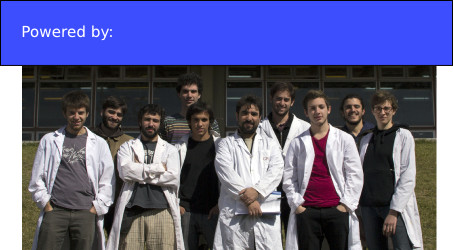Team:Buenos Aires/ summary
From 2013.igem.org
(→To Drink Or Not To Drink) |
|||
| (52 intermediate revisions not shown) | |||
| Line 1: | Line 1: | ||
<div id="external"> | <div id="external"> | ||
| - | + | = To Drink Or Not To Drink = | |
| - | + | ||
| - | + | ||
| - | + | ||
| - | + | [[File:Icono_proyecto.jpg|frameless|border|left|150 px|caption]] <div id="inwiki">'''Contamination''' is a major and continuously growing worldwide problem. As only 2.5% of water is available for human consumption and just 1% of it supplies ecosystems and human populations, contamination in natural springs is a key issue to be addressed. | |
| - | + | At present, the spatial and temporal '''quantification of contaminants is limited''' by the difficulty in processing samples, remoteness of some of the locations and its associated costs. Moreover, the lack of centralization and systematization of data makes it very difficult to obtain accurate information. Our central goal is helping to solve this situation, that is why we thought of a '''biosensor that was cheap and easy to use''' by people without previous training or equipment. | |
| - | + | ||
| - | |||
| - | |||
| - | |||
| - | + | {| class="wikitable" style="background-color:#fff; margin:auto;" | |
| - | + | |- | |
| - | + | |<html> <div id="inwiki"></html> [[File:howworks.gif | link=Team:Buenos_Aires/_device]] <html></div></html> | |
| + | |<html> <div id="inwiki"></html>[[File:bairesGrupal.jpg | link=Team:Buenos_Aires/_students]] <html></div></html> | ||
| + | |} | ||
| - | |||
| - | |||
| - | |||
| - | |||
| - | |||
| - | |||
| - | + | '''Arsenic''' is naturally present in soil and correspondingly in ground water in certain regions. '''Argentina, the United States, Bangladesh and Chile''' are on top of the list of countries with high natural arsenic concentration in certain zones ground water. Population without access to treated water living in these areas is '''exposed to Arsenic consumption'''. This derives in certain health complications such as skin lesions, skin, lung and bladder cancer, and gastro-intestinal and pulmonary disorders. | |
| - | |||
| - | + | ---- | |
| - | + | Crowdfunding video that explains the arsenic problem in a very intuitive manner(spanish version): | |
| - | + | {| class="wikitable" style="margin:auto;" | |
| - | {| class="wikitable" style=" | + | |+ Sensar |
| - | |+ | + | |
|- | |- | ||
| - | | | + | | <html><iframe left="50%" src="//player.vimeo.com/video/75360998" width="500" height="281" frameborder="0" webkitallowfullscreen mozallowfullscreen allowfullscreen></iframe> |
| - | + | <p><a href="http://vimeo.com/75360998">SensAR - Biosensores de Contaminacion en Agua basados en Biologia Sintetica</a> </p> </html> | |
|} | |} | ||
| - | + | Crowdfunding video with english subtitles: | |
| - | [ | + | [http://youtu.be/iiSu6424FC8 Video with english subtitles] |
| + | ---- | ||
| + | |||
| + | |||
| + | {| class="wikitable" style="margin:auto; background: #FFF; border: 0px;" | ||
| + | |+ Arsenic destribution | ||
| + | |- | ||
| + | | | ||
| + | <html> | ||
| + | |||
| + | <div class="gallery autoplay items-2"> | ||
| + | |||
| + | <div class="gallery items-2"> | ||
| + | <div id="item-1" class="control-operator"></div> | ||
| + | <div id="item-2" class="control-operator"></div> | ||
| + | |||
| + | <figure class="item"> | ||
| + | <h1><img align="left" src="https://static.igem.org/mediawiki/2013/thumb/4/4e/Mapa_mundial_arsenico.jpg/500px-Mapa_mundial_arsenico.jpg" alt="Smiley face" height="400" width="600"></h1> | ||
| + | </figure> | ||
| + | |||
| + | |||
| + | <figure class="item"> | ||
| + | <h1><img src="https://static.igem.org/mediawiki/2013/thumb/9/96/Colecta_de_muestras_de_agua.jpg/800px-Colecta_de_muestras_de_agua.jpg" alt="Smiley face" height="400" width="600"> </h1> | ||
| + | </figure> | ||
| + | |||
| + | |||
| + | |||
| + | |||
| + | <div class="controls"> | ||
| + | <a href="#item-1" class="control-button"></a> | ||
| + | <a href="#item-2" class="control-button"></a> | ||
| + | </div> | ||
</div> | </div> | ||
| + | </html> | ||
| + | |} | ||
| + | |||
| + | |||
| + | </div> | ||
| + | |||
| + | |||
| + | |||
</div> | </div> | ||
Latest revision as of 02:04, 29 October 2013
To Drink Or Not To Drink
At present, the spatial and temporal quantification of contaminants is limited by the difficulty in processing samples, remoteness of some of the locations and its associated costs. Moreover, the lack of centralization and systematization of data makes it very difficult to obtain accurate information. Our central goal is helping to solve this situation, that is why we thought of a biosensor that was cheap and easy to use by people without previous training or equipment.
Arsenic is naturally present in soil and correspondingly in ground water in certain regions. Argentina, the United States, Bangladesh and Chile are on top of the list of countries with high natural arsenic concentration in certain zones ground water. Population without access to treated water living in these areas is exposed to Arsenic consumption. This derives in certain health complications such as skin lesions, skin, lung and bladder cancer, and gastro-intestinal and pulmonary disorders.
Crowdfunding video that explains the arsenic problem in a very intuitive manner(spanish version):
|
SensAR - Biosensores de Contaminacion en Agua basados en Biologia Sintetica |
Crowdfunding video with english subtitles:
[http://youtu.be/iiSu6424FC8 Video with english subtitles]
|
|
 "
"


